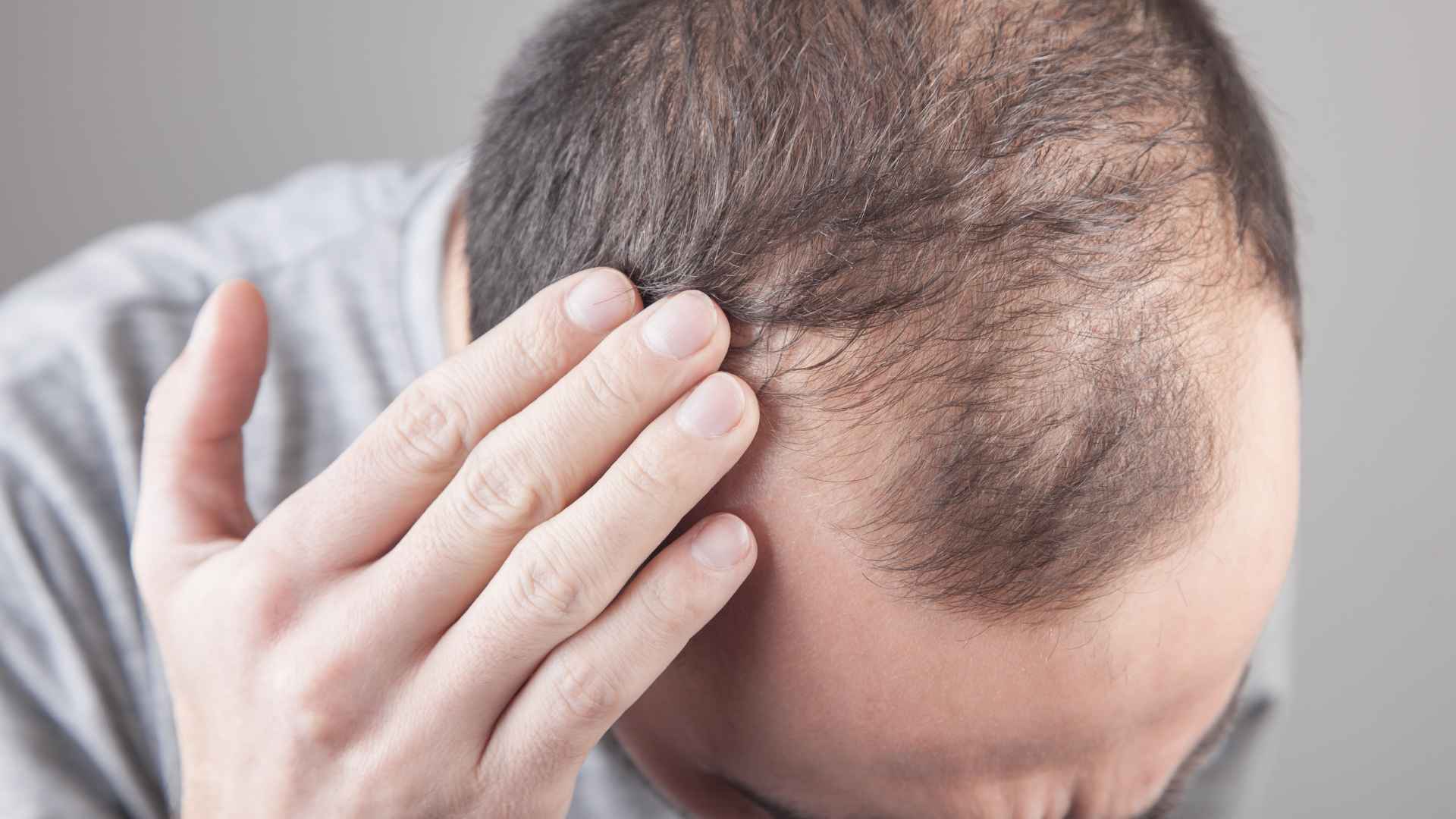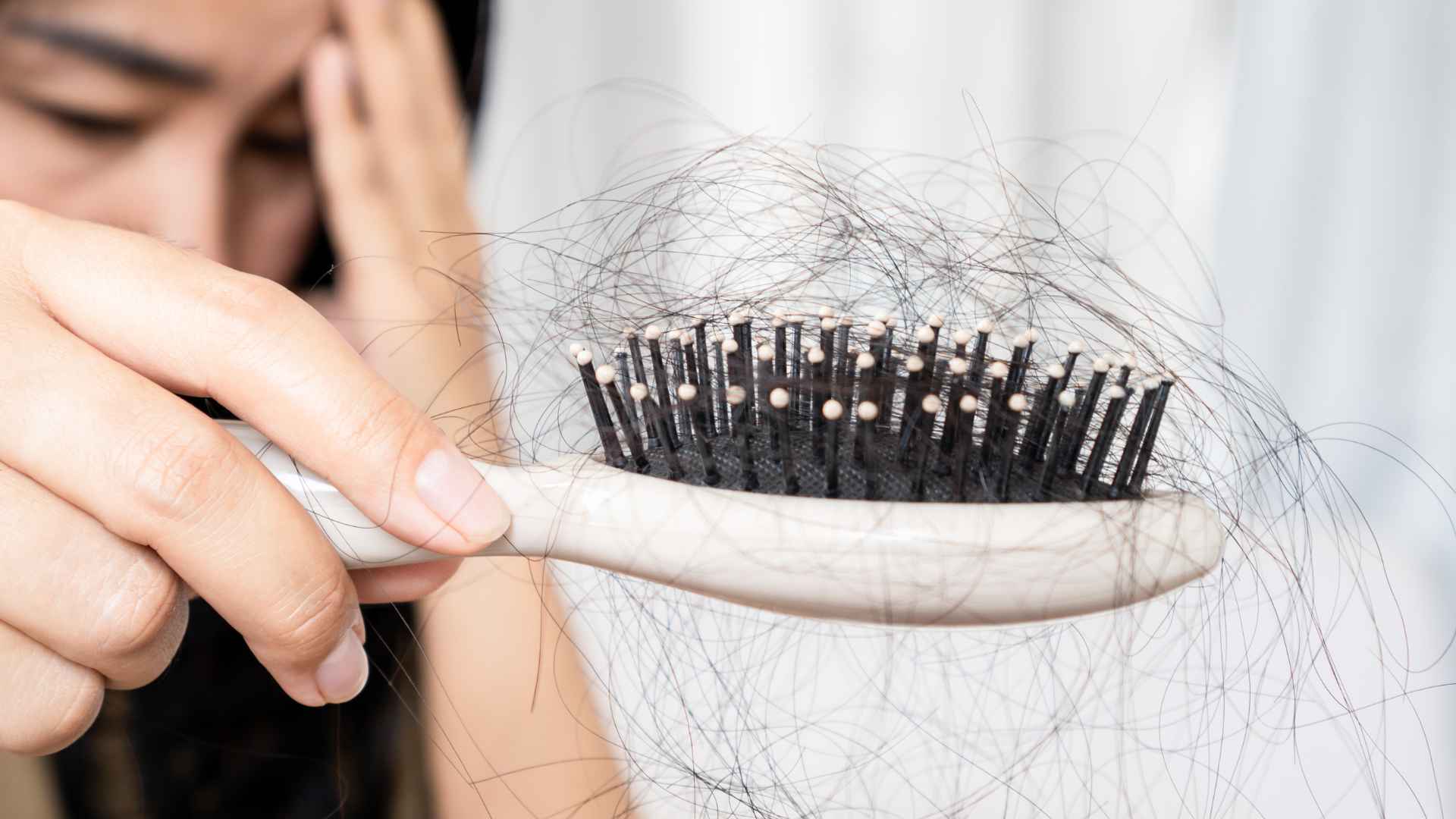Have you ever wondered if hair loss is influenced by genetics? It’s a question that often comes to mind when we notice thinning hair or receding hairlines. In this article, we will delve into the relationship between genetics and hair loss to provide clarity on this subject.
Hair loss is a common concern for both men and women, and it can have a significant impact on self-esteem and overall well-being. Many people believe that genetics play a crucial role in determining whether they will experience hair loss. Understanding the role of genetics in hair loss is essential in dispelling myths and gaining a clearer understanding of this complex topic.
So, if you’re curious about how genetics influence hair loss, grab a seat, and let’s dive into the fascinating world of genetic factors and their impact on our hair.
Hair Loss as the Progressive Thinning or Loss of Hair from the Scalp

Hair loss is a common condition characterized by the progressive thinning or loss of hair from the scalp. It can affect both men and women, and there are various types of hair loss. Let’s explore a few of them:
- Male Pattern Baldness (Androgenetic Alopecia): This is the most common type of hair loss in men. It is characterized by a receding hairline and gradual thinning of hair on the crown of the head. Male pattern baldness is primarily influenced by genetic factors and hormones, specifically the hormone dihydrotestosterone (DHT).
- Female Pattern Hair Loss: Women can also experience a similar pattern of hair loss, but it differs from male pattern baldness. Female pattern hair loss typically involves overall thinning of hair on the top of the head, rather than a receding hairline. Genetic factors, as well as hormonal imbalances, can contribute to this type of hair loss.
It is important to note that genetics play a significant role in certain types of hair loss, including male and female pattern hair loss. While other factors such as hormonal changes, age, and lifestyle may contribute to hair loss, the genetic predisposition is a primary determinant.
Understanding the basics of hair loss helps us recognize the influence of genetics and sets the foundation for exploring how genetics contribute to this condition. Let’s delve deeper into the role of genetics in hair loss.
The Genetic Component of Hair Loss
Hair loss, especially in cases of androgenetic alopecia (male and female pattern hair loss), has a significant genetic component. It is a hereditary condition that can be passed down through generations.
Here’s how genetics play a role:
- Hereditary Nature: Androgenetic alopecia, also known as pattern hair loss, tends to run in families. If your parents or close relatives experienced hair loss, there is a higher likelihood that you may also be predisposed to it. The inheritance pattern can be complex, involving multiple genes from both sides of the family.
- Susceptibility Genes: Certain genes inherited from both parents can make individuals more susceptible to hair loss. These genes can influence the hair follicles’ sensitivity to dihydrotestosterone (DHT), a hormone derived from testosterone. In individuals genetically predisposed to hair loss, DHT can have a negative impact on the hair follicles, leading to gradual miniaturization and shorter hair growth cycles.
- Sensitivity to DHT: The conversion of testosterone to DHT occurs in the body, and DHT binds to receptors in the hair follicles. In genetically susceptible individuals, the hair follicles become more sensitive to the effects of DHT. This sensitivity can result in the miniaturization of the hair follicles, leading to shorter and finer hair strands over time. Eventually, the affected follicles may cease producing visible hair altogether.
While the exact genes responsible for hair loss are still being studied, it is evident that genetics play a crucial role in determining one’s predisposition to hair loss. However, it’s important to note that genetics alone do not determine the outcome of hair loss. Other factors such as hormonal imbalances, age, underlying medical conditions, and environmental influences also contribute to the manifestation and progression of hair loss.
Understanding the genetic component of hair loss helps us recognize that it is a multifactorial condition influenced by a combination of genetic predisposition and other contributing factors. Let’s continue our exploration to gain a deeper understanding of how genetics and other factors interact in the development of hair loss.
The Patterns of Inheritance for Hair Loss.

The patterns of inheritance for hair loss, particularly androgenetic alopecia, can vary. Here’s what you need to know:
- Inheritance from Either Side: Androgenetic alopecia can be inherited from either the mother’s or father’s side of the family. It is not strictly determined by the gender of the parent. Genes associated with hair loss can be passed down through multiple generations on both sides of the family.
- Complex Inheritance: The inheritance pattern for hair loss is complex and can involve multiple genes. It is not as straightforward as a single gene being responsible for the condition. This complexity is why hair loss can present differently within families and why some individuals may experience more severe hair loss than others.
- Increased Likelihood: Inheriting the genes associated with hair loss does not guarantee that an individual will experience hair loss. However, it does increase the likelihood or predisposition to developing hair loss later in life. Other factors such as hormonal imbalances, environmental influences, and lifestyle choices can also contribute to the manifestation and progression of hair loss.
It’s important to understand that inheriting the genes associated with hair loss does not mean that hair loss is inevitable. It means that individuals with a genetic predisposition are more likely to experience hair loss compared to those without the genetic predisposition. Lifestyle factors, hair care practices, and the management of underlying health conditions can influence the extent and progression of hair loss.
By recognizing the patterns of inheritance and the increased likelihood associated with inherited genes, individuals can be more proactive in managing their hair health and seeking appropriate treatments or interventions if needed. Understanding that inheriting the genes is not a guarantee of hair loss provides reassurance that preventive measures and lifestyle choices can make a difference in maintaining healthy hair.
Let’s continue our exploration to gain further insights into the factors that can contribute to hair loss and ways to manage or prevent it.
While Genetics Play a Significant Role, Other Factors Can Also Contribute to Hair Loss.
While genetics play a significant role in hair loss, it’s important to recognize that other factors can contribute to the condition as well. Here are some additional factors that can influence hair loss:
- Hormonal Changes: Hormonal fluctuations can contribute to hair loss. For example, during pregnancy, hormonal shifts can cause temporary hair shedding, while hormonal imbalances such as those associated with thyroid disorders can lead to chronic hair loss. Hormones can interact with genetic factors and impact the sensitivity of hair follicles to hair loss.
- Aging: As we age, our hair follicles go through natural changes. The growth phase (anagen) becomes shorter, resulting in thinner and shorter hair strands. Additionally, hormonal changes that occur with aging can further contribute to hair loss. Genetic factors can determine the rate and extent of hair loss as we age.
- Medical Conditions and Medications: Certain medical conditions, such as autoimmune diseases, scalp infections, and chronic illnesses, can contribute to hair loss. Additionally, some medications used to treat conditions like cancer, high blood pressure, or depression can have hair loss as a side effect. These factors can interact with genetic predisposition and exacerbate hair loss.
- Environmental Factors: External factors such as exposure to pollutants, harsh chemicals, excessive heat, and UV radiation can contribute to hair loss. These environmental stressors can weaken the hair shaft, damage the hair follicles, and interfere with the normal hair growth cycle. Genetic predisposition can determine an individual’s susceptibility to the damaging effects of these environmental factors.
It’s important to note that the interplay between genetic factors and these contributing factors determines the severity and progression of hair loss. Understanding these additional factors helps us take a comprehensive approach to hair loss management and prevention.
By addressing these factors through appropriate lifestyle choices, hair care practices, and seeking medical advice for underlying conditions, it is possible to mitigate the impact of hair loss. It is essential to tailor interventions based on individual circumstances and consider the interaction between genetics and other contributing factors.
Let’s move forward to explore strategies for managing hair loss and maintaining healthy hair despite these influences.
Genetic Testing and Predicting Hair Loss

Genetic testing for predicting the risk of hair loss is becoming increasingly available. These tests analyze specific genetic markers associated with hair loss to provide insights into an individual’s susceptibility to certain types of hair loss, such as androgenetic alopecia. However, it’s important to understand the limitations and implications of genetic testing in this context.
- Insight into Susceptibility: Genetic tests can offer valuable insights into an individual’s genetic predisposition to hair loss. They can identify specific genetic markers that are associated with an increased risk of developing certain types of hair loss. This information can help individuals make more informed decisions about their hair care and explore preventive or treatment options.
- Not a Definitive Prediction: It’s crucial to note that genetic testing is not a definitive prediction of hair loss. While the presence of certain genetic markers may indicate a higher risk, it does not guarantee that hair loss will occur. Hair loss is a complex condition influenced by various factors, including genetics, hormones, age, and lifestyle. Genetic testing provides an additional layer of information but should be considered in conjunction with other factors.
- Informed Decision-Making: Genetic testing can empower individuals to make informed decisions about hair loss prevention and treatment options. Understanding their genetic predisposition to hair loss can guide individuals in adopting appropriate lifestyle choices, seeking early interventions, and exploring personalized treatments if necessary.
It’s important to approach genetic testing for hair loss with a realistic perspective. Genetic predisposition is just one piece of the puzzle, and other factors can also contribute to hair loss. Consulting with a healthcare professional or dermatologist can help interpret the results of genetic testing and provide personalized advice based on the individual’s overall hair health and specific circumstances.
Ultimately, genetic testing can provide valuable information for individuals concerned about their hair loss risk, but it should be seen as a tool to support decision-making rather than a definitive prediction of hair loss. By considering genetics alongside other factors, individuals can take a comprehensive approach to hair loss prevention, management, and treatment.
Let’s move forward to conclude our exploration, summarizing the key takeaways about genetics and hair loss.
How to Cope with Genetic Hair Loss?
For individuals experiencing genetic hair loss, there are several options and strategies to cope with and manage the condition.
Here are some guidance and recommendations:
- Treatment Options: There are various treatment options available for genetic hair loss. These may include medications such as minoxidil or finasteride, which can help slow down hair loss or promote regrowth. Hair transplant procedures can also be considered for more significant hair restoration. Low-level laser therapy (LLLT) devices can be used to stimulate hair growth. Consult with a healthcare professional or dermatologist to discuss the most suitable treatment options based on your individual circumstances.
- Hair Care Practices: Adopt a proactive approach to hair care to maintain the health and appearance of your hair. Use gentle shampoos and conditioners suitable for your hair type, and avoid harsh hair treatments or excessive heat styling. Be mindful of hairstyles that place tension on the hair, as they can exacerbate hair loss. Regularly trim your hair to prevent the appearance of thinning and consider using volumizing styling products to enhance the appearance of density.
- Healthy Lifestyle: Maintaining a healthy lifestyle can contribute to overall hair health. Ensure a balanced diet rich in essential nutrients, including vitamins, minerals, and proteins, which are important for healthy hair growth. Stay hydrated, engage in regular physical activity, and manage stress through techniques such as exercise, meditation, or relaxation practices. While a healthy lifestyle cannot reverse genetic hair loss, it can support overall well-being and contribute to optimal hair health.
- Psychological Support: Coping with hair loss, especially when it is genetic, can be emotionally challenging. Seek support from friends, family, or support groups to share your feelings and experiences. Consider speaking with a mental health professional if you are struggling with self-esteem, body image, or other emotional aspects related to hair loss. Remember that you are not alone, and there are resources available to help you navigate the emotional impact of hair loss.
It’s important to note that the effectiveness of treatment options can vary depending on individual circumstances. Some individuals may respond better to certain treatments than others. Additionally, managing genetic hair loss is a long-term process that requires patience and consistency. Results may take time, and it’s important to set realistic expectations.
By combining appropriate treatment options, adopting a proactive approach to hair care, maintaining a healthy lifestyle, and seeking emotional support when needed, individuals can effectively cope with genetic hair loss and manage its impact on their lives.
In conclusion, while genetic hair loss can be challenging, there are strategies and treatments available to cope with the condition. Explore treatment options, adopt a proactive hair care routine, prioritize a healthy lifestyle, and seek support when needed. Remember, your worth is not defined by your hair, and there are resources and support systems available to help you embrace your unique beauty.
Seeking Professional Advice

If you are experiencing hair loss, it is highly recommended to consult with a dermatologist or trichologist for a comprehensive evaluation and personalized treatment plan. Here’s why professional advice is crucial:
- Proper Diagnosis: Healthcare professionals specializing in hair and scalp conditions can accurately diagnose the underlying cause of your hair loss. They will evaluate genetic and non-genetic factors, conduct necessary tests, and consider your medical history to determine the most appropriate course of action.
- Understanding Genetic Factors: A dermatologist or trichologist can assess the genetic factors contributing to your hair loss and help you understand the specific genetic influences on your condition. They can explain how genetics interact with other factors and guide you on the best treatment options and preventive measures.
- Personalized Treatment Plan: Based on a thorough evaluation, healthcare professionals can create a personalized treatment plan tailored to your unique circumstances. This may include recommending specific medications, procedures, or therapies to address genetic and non-genetic factors associated with your hair loss. They can monitor your progress and adjust the treatment plan as needed.
- Expert Advice and Guidance: Dermatologists and trichologists possess specialized knowledge and expertise in hair and scalp health. They stay updated on the latest research and advancements in the field. By seeking their advice, you can benefit from their in-depth understanding and receive evidence-based recommendations.
Remember, self-diagnosis and self-treatment may not be effective or address the underlying causes of hair loss. Consulting a professional ensures a proper evaluation, accurate diagnosis, and appropriate interventions for your specific needs.
If you are concerned about your hair loss, don’t hesitate to schedule an appointment with a dermatologist or trichologist. They can provide expert guidance, evaluate genetic and non-genetic factors, and recommend effective treatments or interventions to manage your condition.
In conclusion, seeking professional advice is essential for a proper diagnosis, understanding genetic influences, and receiving personalized treatment options. A healthcare professional specializing in hair and scalp health can evaluate the factors contributing to your hair loss and guide you on the most appropriate interventions to address your specific needs.
Watch Is hair loss genetic? | fact or myth | Video
Top 5 FAQs and answers related to is hair loss genetic
Is hair loss genetic?
Yes, hair loss can have a genetic component. Certain types of hair loss, such as male pattern baldness (androgenetic alopecia) and female pattern hair loss, are influenced by genetic factors. Genetic predisposition can increase the likelihood of developing these types of hair loss, but it does not guarantee hair loss.
Can hair loss skip a generation?
Yes, hair loss can skip a generation. The inheritance pattern for hair loss is complex and can involve multiple genes from both sides of the family. It is possible for individuals to inherit the genetic predisposition for hair loss from their parents or grandparents, even if their immediate family members do not experience significant hair loss.
Does hair loss come from the mother’s side or father’s side?
Hair loss can be inherited from either the mother’s side or the father’s side. The genetic factors associated with hair loss can be passed down through multiple generations on both sides of the family. Hair loss is not strictly determined by the gender of the parent.
How much of hair loss is determined by genetics?
The extent to which genetics influence hair loss varies among individuals. Genetic factors can play a significant role in certain types of hair loss, such as male and female pattern hair loss. However, other factors, such as hormonal imbalances, age, and lifestyle, also contribute to hair loss. The interplay between genetics and these factors determines the overall manifestation and progression of hair loss.
Can I prevent genetic hair loss?
While you cannot prevent genetic hair loss entirely, there are steps you can take to manage and minimize its impact. Maintaining a healthy lifestyle, adopting a proactive hair care routine, seeking professional advice, and considering available treatments can help slow down hair loss, promote hair growth, and manage the condition effectively.
Conclusion
In conclusion, let’s recap the main points discussed in the article:
- Hair loss can have a genetic component, particularly in cases of androgenetic alopecia (male and female pattern hair loss).
- Genetic factors play a significant role in determining an individual’s susceptibility to hair loss, but they are not the sole determining factor.
- Hair loss can be inherited from either the mother’s or father’s side of the family, and it can skip generations.
- While genetics influence the likelihood of hair loss, other factors such as hormonal changes, aging, medical conditions, and environmental influences also contribute to the condition.
- Genetic testing can provide insights into an individual’s susceptibility to certain types of hair loss but does not guarantee hair loss will occur.
- Coping with genetic hair loss involves a multifaceted approach, including seeking professional advice, considering available treatment options, adopting healthy lifestyle habits, and maintaining a proactive hair care routine.
- Treatment options for genetic hair loss include medications, hair transplants, low-level laser therapy, and more, which can be recommended by healthcare professionals based on individual needs.
- It’s important to consult with a dermatologist or trichologist for a proper diagnosis, personalized treatment plan, and expert guidance.
- While genetics may influence hair loss, there are various interventions and support available to manage and address the condition effectively.
If you are experiencing hair loss or have concerns about the genetic aspect, seeking professional advice is crucial. A healthcare professional specializing in hair and scalp health can evaluate your specific situation, recommend suitable treatments, and guide you on the best course of action.
Remember, you are not alone in your journey. With the right guidance and appropriate interventions, you can effectively manage genetic hair loss and take steps towards maintaining healthy hair.
Please share this Is Hair Loss Genetic? The Role of Genetics in Hair Loss with your friends and do a comment below about your feedback.
We will meet you on next article.
Until you can read, What Vitamin Deficiency Causes Hair Loss and Thinning? Guide